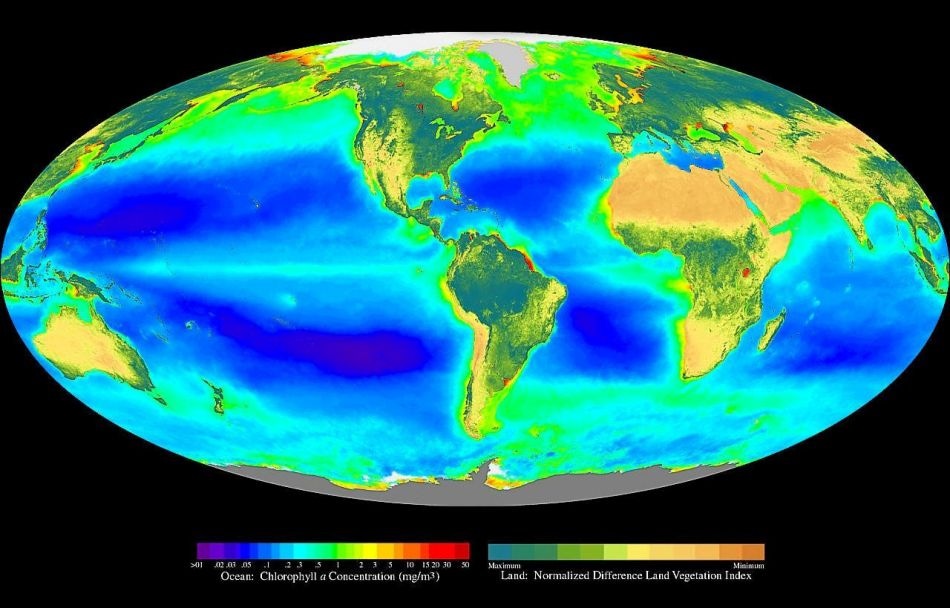Nov 2 2018
Sulfur can be found in various different compounds across the globe—not just in the atmosphere but also on land and in the oceans. These manifestations are linked in a cycle.
 Chlorophyll (= algae) in the sea: single-cell algae produce a new chemical compound discovered by chemists at the University Jena. (Image credit: NASA)
Chlorophyll (= algae) in the sea: single-cell algae produce a new chemical compound discovered by chemists at the University Jena. (Image credit: NASA)
In simple terms, in its mineral form, the element is reduced and transformed into organic compounds. Various organisms pass around these compounds before they finally reach the atmosphere. In the atmosphere, they are oxidized before returning to the seas and land through the rain. Although this fact has been known for some time, chemists from the Friedrich Schiller University Jena (Germany) and their US counterparts have now found out an entirely unanticipated shortcut in the cycle. This process is governed by tiny organisms in the ocean’s plankton. The discovery has been reported in the current edition of the renowned research journal Nature.
“We’ve found that certain single-cell algae and bacteria, which form part of the plankton in the sea, produce a new chemical compound with the complicated name ‘dimethylsulphoniopropionate’, or ‘DMSOP’ for short,” explained Professor Dr Georg Pohnert from the University of Jena. “This has allowed us to deduce valuable information about the global sulphur cycle, and we can now provide a new explanation for huge quantities of sulphur flow in the cycle. Even though one microalga only produces negligible quantities of the compound, we’re talking about several teragrams in total, so several billion kilograms a year.” This is due to the fact that single-cell algae are amazingly active in the oceans around the world. The discovery by Jena’s chemists offers better insights into the earth’s sulfur cycle, which provides significant knowledge for climatic and atmospheric models.
Stress protection for algae
Yet, the information provided by the study results not only helps us gain better insights into the sulfur cycle; the researchers discovered one reason behind the production of DMSOP by analyzing the way the algae adapt to their surroundings. “These single-cell organisms are permanently moving around in the sea, and so they’re constantly exposed to different salt contents and oxidative stress,” explained Pohnert. “The new compound now shows how this stress can be balanced out through a sophisticated system of chemical reactions. One way of doing this is by producing and breaking down highly polar organic molecules. And the new sulphurous metabolic product plays a key role here.”
Jena’s researchers, whose study was supported by the German Research Foundation’s “ChemBioSys” collaborative research center, investigated water samples from different regions of the oceans to verify whether the generation of the sulfurous compound was a worldwide phenomenon. “We found DMSOP in all samples from the Arctic to the Mediterranean,” explained Professor Pohnert, who also works at the University of Jena’s Cluster of Excellence, “Microverse.” “So, producers of the sulphurous compound can be found everywhere.”
These new outcomes have offered important information related to the functioning of microbial communities in the ocean to the chemists from the University of Jena, and the outcomes are also relevant for probable applications. “More and more algae are being grown in aquaculture to produce animal feed, foodstuffs and energy. That’s why it’s important to fully understand their metabolism,” stated the expert from Jena. “Our current insights have once again revealed what an incredibly complex and effective system is hidden away in plankton.”